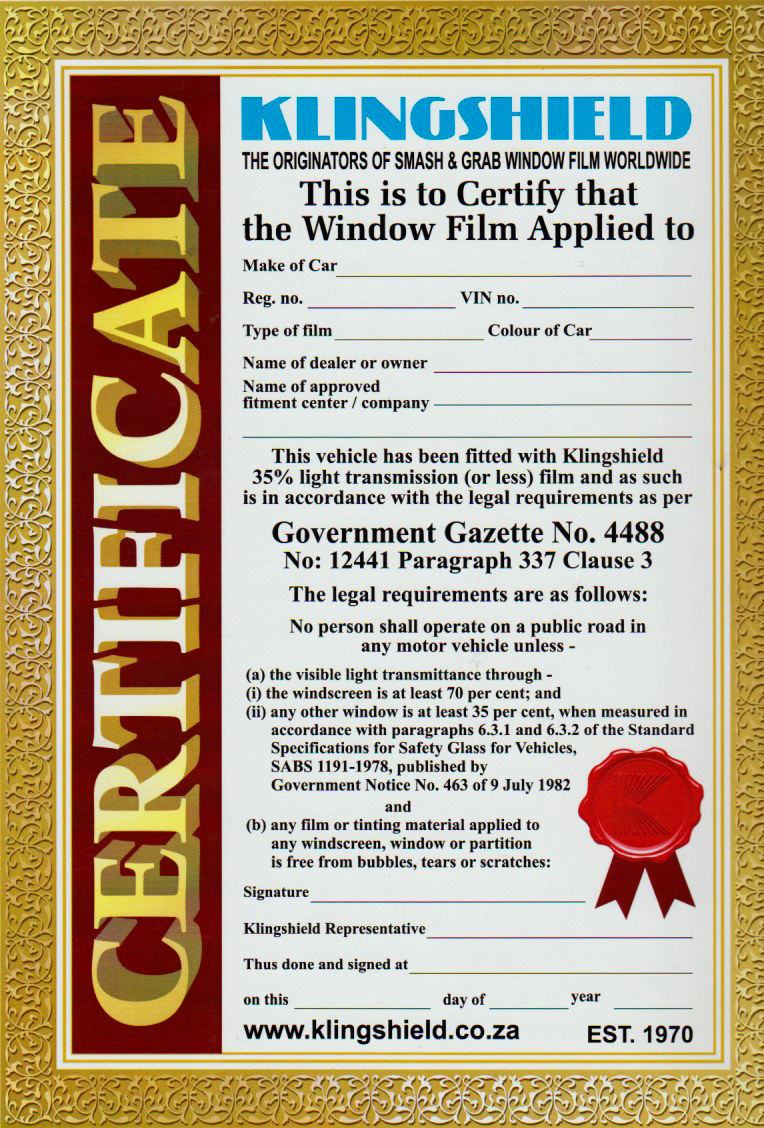Watch out Illegal Window Tinters!
Watch out Illegal Window Tinters!
Over the last 40 years countries throughout the world have passed certain laws regarding the tinting of car windows. Tremendous amounts of effort by numerous people in the window film industry have assisted in coming up with specifications to suit the window tinting market. Various tests have been carried out by traffic authorities worldwide and in most countries 35% visible light transmission window film has been chosen as the ideal window tint for cars.
Window film applied to car windows has many benefits and is an excellent product as it saves lives and reduces energy. Consumers throughout the world have over the last four decades taken advantage of car window tinting and today in numerous countries window film on car windows is the most popular after market product available.
In South Africa the main reason consumers utilise window film is for safety. Once the film has been applied and laminated to the glass it turns the ordinary glass into shatterproof glass, making it safer and more resistant to impact. “Smash & Grab” is rife in South Africa and patriotic people who live in this country realise that to stay here one needs maximum security for themselves and their families. Klingshield window film applied to car windows will also hold the glass together should the vehicle be involved in an accident.
Illegal dark window tinting is utilised by certain consumers who have no regard for the law. Dark window tinting is very dangerous as it cuts the majority of the light and on a dark night or rainy day visibility is impaired and creates a dangerous driving environment. In some countries dark illegal window tinting is banned because of security reasons. Law enforcement offices are unable to see who and how many people are in a particular car. Most traffic authorities worldwide go on blitzes, stopping people with dark window tint and in many cases find other illegal activities, resulting in many arrests worldwide.
In most countries throughout the world vehicle testing is an annual occurrence. It is interesting to read that at the South African Government Road Safety Conference held recently in Pretoria, discussions were carried out regarding the introduction of annual testing. The Deputy Minister of Transport, Jeremey Cronin, said vehicles are only retested when being sold. We need safer vehicles, safer roads, safer transport systems and responsible drivers who do not utilise dark illegal films on their vehicles.
The Road Safety Forum is now looking at testing vehicles annually, which will create a problem for all drivers with illegal tinting. Klingshield throughout its years of operation have always insisted on only applying legal 35% light transmission window films. This legal tint will reject 65% of the daytime and night time glare, as well as up to 60% of the infra red, which is the infra red (heat) from passing through car windows.
Klingshield’s window film known as “smash and grab”, also has the ability to shatterproof the car windows and stop 99% of the ultra violet light, which is the main cause of deterioration of interior upholstery, plastic, etc.
Manufacturers are also now offering what they call privacy glass, as a standard in many vehicles. However, some manufacturers are not taking into consideration local laws and have dark tinted glass installed in back passenger and back windows. Technically, this is illegal.
However, authorities seem to overlook this problem as it would be impractical to replace the glass in various cars as certain moulds are not available locally and it is not possible to replace with clearer glass. This is a grey area that has been swept under the carpet. The important thing is they only utilise this “privacy glass” in back areas of cars and not in the driver and passenger windows, which are the most important windows to have good visibility when driving.
Window tinting is also the number one after market product in the motor industries in many countries. The awareness of ultra violet light and its harmful effects, eg. Skin cancer, melanoma, etc. in Australia, plays an important role in the decision of drivers to cut out the UV.
Klingshield were originally involved with the South African Bureau of Standards in coming up with a specification to legalise window tinting some 20 years ago.
Should any consumer need to have their windows tested for visible light transmission, testing equipment is available at Klingshield’s Head Office, 33 Durham Street, Raedene.
For more information please contact us.

